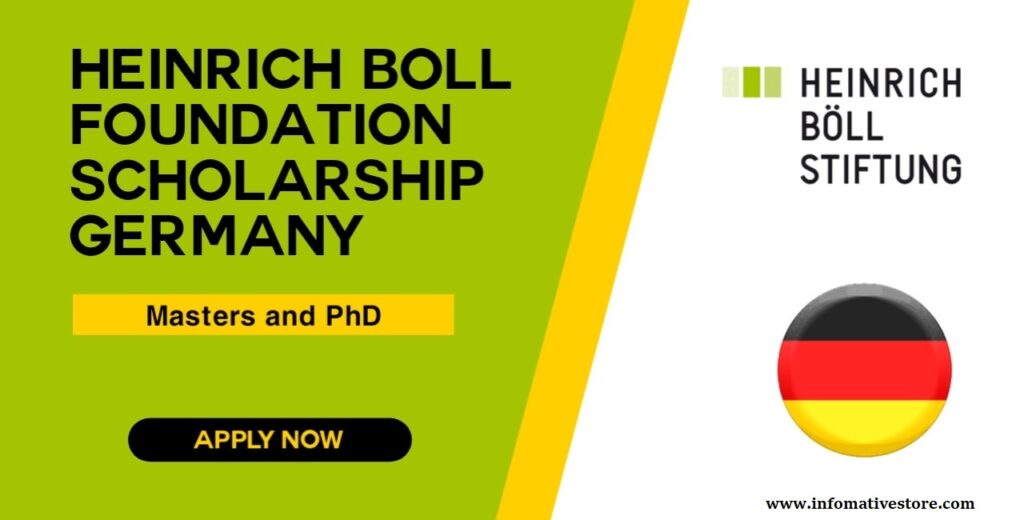
Heinrich Boll Scholarships offers around 1,500 scholarships every year to German and international undergraduate, graduate, and doctoral students studying any subject at a German higher education institution. Students interested in the Heinrich Boll Scholarships must have outstanding academic records, and be politically and socially engaged. Also, they should have a keen interest in the foundation’s basic values, including sustainability and ecology, human rights and democracy, and justice.
Notably, the foundation awards scholarships as per the guidelines set by the Foreign Office and Germany’s Federal Ministry of Education and Research (BMBF). The university offers scholarships for the regular period of study..
Heinrich Boll Scholarships Reward Amount
For undergraduate and graduate students: Students educated in Germany and EU nationals (not educated in Germany) may receive a monthly amount of up to USD 713 plus USD 330 book money. This funding varies according to the recipient’s personal or parental income and assets. Non-EU nationals (not educated in Germany) will receive a monthly amount of USD 934 along with various individual allowances
For doctoral students: Students educated in Germany and EU nationals (not educated in Germany) will receive a monthly amount of USD 1484 along with USD 110 every month for covering research costs. Non-EU nationals (not educated in Germany) will receive a monthly amount of USD 1319 along with USD 110 every month as mobility allowance and various individual allowances.
Application Process
How to Apply for Heinrich Boll Scholarships?
The Heinrich Boll Foundation only accepts online applications. The online portal opens around six weeks prior to the deadline for applying. To apply for the scholarship:
- Check the next deadline on the official website of the Heinrich Boll Foundation.
- Access the form from the foundation’s online portal.
- Fill the form completely and correctly.
- Attach the required documents in PDF format to the online application.
- Submit the completed application and all the necessary documents before the deadline.
Required Documents
Following are the documents applicants are required to submit while applying for the scholarship:
- Application requires completed form, personal data, CV, motivation for applying, studying chosen subject, political interests, social commitments, and thesis outline
- A copy of the applicant’s university entrance qualification, Abitur or baccalaureate. Attach an English or German translation by a certified translator, if required.
- If an applicant has already begun their studies, they must submit a list of study certificates up to the current date
- Foreign master’s degree applicants must provide certified copy of first-degree certificate (with English or German translation if necessary)
- Applicants will also have to submit an explanation of the grading in case it is different from the German system.
- Student enrolment certificate
- A 1-2 page long reference on the applicant’s social commitment by a representative of an organization or an institution
- A 1-2 page long expert reference by a university/college lecturer or a school teacher (in case of secondary-level students). Those applying for doctoral scholarships have to submit two expert references.
- Doctoral students must also include a detailed exposé of their research project as an attachment
Selection Process
The selection process for granting the scholarship comprises three stages:
- Stage 1: Applications must include written submission, required documents: expert reference, personal reference on social commitment, academic record, political interest, scholarship reason, research project quality.
- Stage 2: After assessing the application, a liaison lecturer typically conducts an hour-long interview at the applicant’s university or nearby residence. The interview can also be telephonic. After the interview, the liaison lecturer attaches a report to the application.
- Stage 3: Suitable applicants will have to attend a selection workshop held in Berlin that consists of a group discussion and personal interview.
At the end of each stage, only a few applicants are selected. The decision taken at the selection procedure’s each stage is communicated to the applicants in writing. Students may reapply if they could not clear the first or the second stage. However, we do not allow applicants who have participated in the selection workshop and were rejected to re-apply
